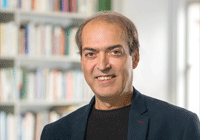
Photo credits:
Sarah Thorén
Salman Bashier
EURIAS Fellow, SCAS.
Independent Scholar of Islamic Mysticism and Philosophy
Salman Bashier was born in 1964 in Israel. He studied sociology and philosophy at the University of
Haifa and received a master’s degree in philosophy with a thesis on the concept of contradiction in
Kant and Hegel. In 1994 Bashier was awarded a Fulbright Fellowship to begin his doctoral studies at
the University of Utah. He graduated in 2000 from the Middle East Center with a dissertation that was
published in 2004 under the title Ibn al-'Arabi’s Barzakh: The Concept of the Limit and the Relation-
ship between God and the World and is considered one of the influential works in the study of Ibn al-'
Arabi, the greatest of Islamic mystics (d. 1240).
Bashier was awarded a postdoctoral fellowship at Ben-Gurion University of the Negev, where he served
as a visiting lecturer in addition to his work as a visiting lecturer at the University of Haifa. In 2007 he
was awarded a one-year fellowship at the Wissenschaftskolleg zu Berlin, followed by a five-year Polonsky
Fellowship at Van Leer Jerusalem Institute. Bashier is the author of The Story of Islamic Philosophy: Ibn
Tufayl, Ibn al-'Arabi, and Others on the Limit between Naturalism and Traditionalism (2011) and Ibn al-'
Arabi and Averroes on Imagination, Conjunction, and Knowledge of the Self (2017, in Arabic). He is
currently working on his new project: “An Islamic Account of the Four Stages of the Philosophical-Mystical
Journey: Ibn al-''Arabi’s School and the Completion of the Platonic Turn in Islamic Thought.” The project
presents a fully articulated and highly innovative interpretation of Plato’s Allegory of the Cave from a liminal
mystico-philosophical point of view, an interpretation Bashier believes is greatly significant for revealing
an important layer of Islamic intellectuality and also contributes to understanding our contemporary philo-
sophical investigations.
This information is accurate as of the academic year 2018-19.






